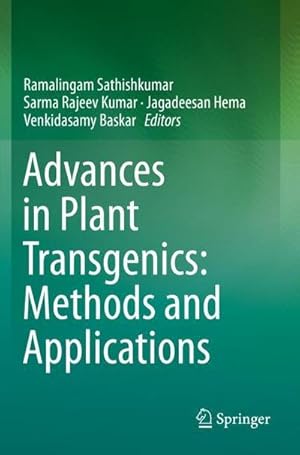9789811396267 - Advances in Plant Transgenics: Methods and Applications (2 Ergebnisse)
FeedbackSuchfilter
Produktart
- Alle Product Types
- Bücher (2)
- Magazine & Zeitschriften (Keine weiteren Ergebnisse entsprechen dieser Verfeinerung)
- Comics (Keine weiteren Ergebnisse entsprechen dieser Verfeinerung)
- Noten (Keine weiteren Ergebnisse entsprechen dieser Verfeinerung)
- Kunst, Grafik & Poster (Keine weiteren Ergebnisse entsprechen dieser Verfeinerung)
- Fotografien (Keine weiteren Ergebnisse entsprechen dieser Verfeinerung)
- Karten (Keine weiteren Ergebnisse entsprechen dieser Verfeinerung)
- Manuskripte & Papierantiquitäten (Keine weiteren Ergebnisse entsprechen dieser Verfeinerung)
Zustand Mehr dazu
- Neu (2)
- Wie Neu, Sehr Gut oder Gut Bis Sehr Gut (Keine weiteren Ergebnisse entsprechen dieser Verfeinerung)
- Gut oder Befriedigend (Keine weiteren Ergebnisse entsprechen dieser Verfeinerung)
- Ausreichend oder Schlecht (Keine weiteren Ergebnisse entsprechen dieser Verfeinerung)
- Wie beschrieben (1)
Einband
- alle Einbände
- Hardcover (Keine weiteren Ergebnisse entsprechen dieser Verfeinerung)
- Softcover (2)
Weitere Eigenschaften
- Erstausgabe (Keine weiteren Ergebnisse entsprechen dieser Verfeinerung)
- Signiert (Keine weiteren Ergebnisse entsprechen dieser Verfeinerung)
- Schutzumschlag (Keine weiteren Ergebnisse entsprechen dieser Verfeinerung)
- Angebotsfoto (2)
Sprache (1)
Preis
- Beliebiger Preis
- Weniger als EUR 20 (Keine weiteren Ergebnisse entsprechen dieser Verfeinerung)
- EUR 20 bis EUR 45 (Keine weiteren Ergebnisse entsprechen dieser Verfeinerung)
- Mehr als EUR 45
Gratisversand
Land des Verkäufers
Verkäuferbewertung
-
Advances in Plant Transgenics: Methods and Applications
Verlag: Springer Nature Singapore, Springer Nature Singapore Nov 2020, 2020
ISBN 10: 9811396264 ISBN 13: 9789811396267
Sprache: Englisch
Anbieter: buchversandmimpf2000, Emtmannsberg, BAYE, Deutschland
EUR 160,49
Währung umrechnenKostenlos für den Versand innerhalb von/der DeutschlandAnzahl: 2 verfügbar
In den WarenkorbTaschenbuch. Zustand: Neu. Neuware -The green revolution led to the development of improved varieties of crops, especially cereals, and since then, classical or molecular breeding has resulted in the creation of economically valuable species. Thanks to recent developments in genetic engineering, it has become possible to introduce genes from different sources, such as bacteria, fungi, viruses, mice and humans, to plants. This technology has made the scientific community aware of the critical role of transgenics, not only as a means of producing stress tolerant crops but also as a platform for the production of therapeutics through molecular farming.This book discusses the commercial applications of plant transgenic technologies, including the use of transgenic cell culture approachesto improve the production of metabolites and high-value therapeutics as well as transgenic plants in pest management. It also explores generation of novel vectors, protein production using chloroplast engineering and the latest developments in this area, such as genome editing in plants. Featuring general discussions and research papers by leading international experts, it is a valuable resource for scientists, teachers, students and industrialists working in the field.Springer Verlag GmbH, Tiergartenstr. 17, 69121 Heidelberg 388 pp. Englisch.
-
Advances in Plant Transgenics: Methods and Applications
Verlag: Springer Nature Singapore, Springer Nature Singapore, 2020
ISBN 10: 9811396264 ISBN 13: 9789811396267
Sprache: Englisch
Anbieter: AHA-BUCH GmbH, Einbeck, Deutschland
EUR 164,49
Währung umrechnenKostenlos für den Versand innerhalb von/der DeutschlandAnzahl: 1 verfügbar
In den WarenkorbTaschenbuch. Zustand: Neu. Druck auf Anfrage Neuware - Printed after ordering - The green revolution led to the development of improved varieties of crops, especially cereals, and since then, classical or molecular breeding has resulted in the creation of economically valuable species. Thanks to recent developments in genetic engineering, it has become possible to introduce genes from different sources, such as bacteria, fungi, viruses, mice and humans, to plants. This technology has made the scientific community aware of the critical role of transgenics, not only as a means of producing stress tolerant crops but also as a platform for the production of therapeutics through molecular farming.This book discusses the commercial applications of plant transgenic technologies, including the use of transgenic cell culture approachesto improve the production of metabolites and high-value therapeutics as well as transgenic plants in pest management. It also explores generation of novel vectors, protein production using chloroplast engineering and the latest developments in this area, such as genome editing in plants. Featuring general discussions and research papers by leading international experts, it is a valuable resource for scientists, teachers, students and industrialists working in the field.



